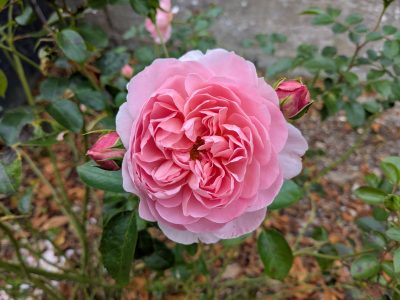 I’ve been reading Volume 2 of the Memoirs of a Highland Lady, the fascinating memoirs of Elizabeth Grant of Rothiemurchus who kept this particular diary between 1814-30.
I’ve been reading Volume 2 of the Memoirs of a Highland Lady, the fascinating memoirs of Elizabeth Grant of Rothiemurchus who kept this particular diary between 1814-30.
In it there’s a good example of the social attitude which made it so hard for young women to perform musical instruments in public in the early 19th century. Elizabeth recounts having harp lessons in 1817 with a French harp teacher, Monsieur Elouis. She took part in group lessons with seven other ‘well-born’ girls, several of whom played very well.
‘We played concerted pieces doubling the parts. Chorus’s arranged by him, and sometimes duetts or solos, practising in other rooms. The fame of our execution spread over the town, and many persons entreated permission to mount up the long Common Stair to the poor frenchman’s garret to listen to such a number of harps played by such handsome girls. One of two of the Mamas would have had no objection, but my mother and Lady Hunter would not hear of their daughters being part of an exhibition. We went there to learn, not to shew off.’
She goes on to describe the day when M. Elouis brought a ‘very large fine looking military man, braided and belted and moustached’ to his garret hear the young ladies play their harps. But when Elizabeth’s governess realised that she was about to be put on public display (even just for an audience of one), ‘we were shawled and bonnetted in less time than I am writing of it, and on our way down stairs before poor Monsieur had finished his apologies to the officer and the other young ladies… We never returned to the Harp Classes, neither did the Hunters, and very soon they were given up. It was certainly an unwarrantable liberty, an impertinence, and the man must either have been totally unaware of the sort of pupils he was to find, or else an illbred ignorant person. Poor Elouis never recovered the mistake; he had to leave for want of business.’
When one realises the extent of the disapproval felt by polite society about the idea of their wives and daughters playing in public, one admires even more those women who did persist, did manage to take their musical talent onto the concert stage and to rise above the disquiet which their families probably went on expressing in the background.




One would weep to read that had we not been fortunate to live on into an age which shows progress is possible, and perhaps even inevitable. Incidentally, I do like the old spelling of ‘shew’. My favourite usage is in a letter of Elgar, referring to the second symphony, the violin concerto and ‘The Music Makers’: “In these three works I have SHEWN myself!” he enthuses.
I like the spelling of ‘shew’ as well. I wonder if it was ever pronounced ‘shoo’? Or to put it another way, if it was always pronounced ‘show’, why was it ever spelled ‘shew’?
How sad to think of the thousands of women, of all ages, who were deprived of the opportunity to grow and develop their talents, both musically and socially. Like flowers kept in a jar. Remembering the tragedy of Nannerl Mozart, who was paraded in public with her younger brother as a child and then closeted away as soon as she reached the age of 12! A similar fate awaited Fanny Mozart, who was married off and closeted away. Fortunately, her husband was supportive of her musical endeavours, but she was still forbidden (by her famous brother) to publish her compositions!
You’re right, Nan, these are sad things to think about. (I think you meant Fanny Mendelssohn, by the way.)
Nan
I think it is worthwhile looking at the importance of women in Classical music from a different perspective. Without a female patron, none of Scarlatti’s 550-odd sonatas would have been written and I am sure that much of the piano music written in late 18th and 19th century would have been written with women in mind. Thinking of Beethoven in particular or even the Shostakovich Preludes and Fugues.
Some of the more successful female composers probably deserve more attention than than the likes of Clara Schumann and Fanny Mendelssohn. At the moment I am learning the “Trois morceaux” by Lili Boulanger, one of the great composers of the early 20th century and who would have been better known it she had not died young. She was apparently Bill Evans’ favourite composer and her work has also been adapted for the jazz orchestra led by the Belmondo Brothers. She was a truly great composer whose work should be celebrated. I also like Cecile Cheminade and have heard pieces by Louise Ferrenc (who had a successful career in academia ) which make me think she deserves more attention.
The contemporary scene is choc-a-bloc with brilliant female composers. I wondered if anyone listened to CofW a few weeks back when it featured the music of Eleanor Alberga ? She was a new name for me but I was hugely impressed by her compositions and the programme made a similar impressions of a couple of my jazz friends. I would suggest that the adaption of the Roald Dahl book into a piece of music is probably the most fun to have been had in contemporary classical music since Darius Milhaud in 1920s! I have a CD of Caroline Shaw’s string music which I really love too. If you cross over the the realms of jazz, are they any better arrangers / composers working in the music at the moment than Maria Schneider. Even if you go back into the 1930s, the arrangements May Lou Williams was writing for Andy Kirk’s band in the 1930s were really innovative – kind of “chamber big band”, if you like on top of being a brilliant pianist and teacher of Thelonious Monk.
I tend to listen to listen to more obscure classical music which piques my interest so I have come across quite a few female composers.
I think the more you explore music, the more you appreciate that some of the stereotype are wrong. Women have always been writing great music.
Cheers
Ian
Thank you Ian for drawing our attention to these female composers. You’re right: there is much to explore and appreciate in the music of the past, and many fine contemporary female composers to discover.
Have you come across my book ‘Women and the Piano’ (2024)? I write about some of the female composers you mention – the ones who were primarily pianists, anyway. The book is focused on the history of women playing the piano, rather than the history of female composers. There’s an overlap between the two categories of course.
Susan
Good evening
I have not read your Women and the piano book” although I enjoyed the piano book about the 100 compositions which was informative and really balanced in the assessment of the wide range of piano composers you focussed on. The chapters on Debussy and Ravel resonated most with me but I liked to read about music that I was largely unaware about too. It was also rewarding to read about pieces I have tried to learn such as Goldberg Variations, the Scarlatti and Haydn sonatas, the Chopin Preludes and Faure Nocturnes. (Way too difficult for me but I love the harmonies. It is more a matter of curiosity for me because I need to know how these composers make the sounds they do. ) I did read the Anna Beer book about female composers a few years ago and was really disappointed with it, largely because of the tone of writing but also because I am not a fan of the Early Music composers although I love the Christina Pluhar recordings which involve improvisation and make the music more rewarding. Otherwise, I tend to start off with J S Bach and Scarlatti.
I was really fascinated by your account of Maria Syzmanowska because I had never heard of her before and was fascinated to read your comment that she was an influence on Chopin. I have not managed to find any of her music on Musicroom but I am keen to explore her work. There are some pieces on Youtube. Incidentally, I am a fan of Karol Syzmanowski who I was told I would as I really enjoy Scriabin. /when I initially opened your book, I thought it was a typo. I have his Opus No, 1 Preludes and Opus 3 variations which I struggle with but really like .) Syzmanowski sounds to me like the meeting point between Scriabin, Bartok and Debussy.
For me, I would agree with a colleagues assessment that Scriabin’s piano music is akin to John Coltrane insofar that the earlier work is very thorough harmonically yet the later music uses a narrower harmonic range but with greater spiritual intensity. Setting aside the Second Viennese School composers, I think that Classical music reached it’s peak in the late 1800s to mid 1900s.
I am really keen to read your “Nocturnes” book as I envisage it will feature the likes of Chopin, Field, Faure and Poulenc who are composers I admire. This is where Classical piano music gets interesting for me. One Nocturne I like is the one by Nicanor Abelardo in C# minor. Like a lot of his Philippine contemporaries, much of his music was lost in WWII. I was surprised that there are quite a few composers from this country who are pretty decent but this is the piece that I have been most taken by. I was amazed to discover this and even my wife was unaware of him even though she is from the Philippines herself. There is a modern woman composer called Lucrecia Kasilag who is quite celebrated over there and whose work you can listen to on Youtube. A lot of her work was based on folk music. Maybe someone else for Nan to explore ? Elsewhere, I find that the Philippine music seems to follow whoever was popular whether it is Chopin, Debussy or Sousa.
There is so much music that is not as familiar as it should be and I never cease to be amazed at what work you can uncover whether it is Herbie Nichols, Elmo Hope, Andrew Hill, Lili Boulanger or Villa -Lobos. I am as happy to listen to Leroy Carr as I am to Oliver Messiaen.
I am glad you are a Thelonious Monk fan too, though!
Cheers
Ian